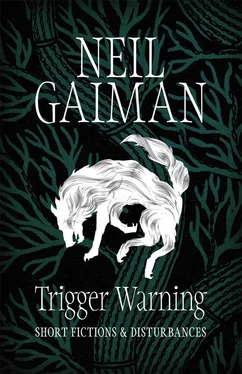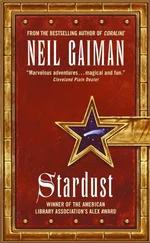Neil Gaiman - Trigger Warning - Short Fictions and Disturbances
Здесь есть возможность читать онлайн «Neil Gaiman - Trigger Warning - Short Fictions and Disturbances» весь текст электронной книги совершенно бесплатно (целиком полную версию без сокращений). В некоторых случаях можно слушать аудио, скачать через торрент в формате fb2 и присутствует краткое содержание. Год выпуска: 2015, Издательство: Headline, Жанр: Старинная литература, на английском языке. Описание произведения, (предисловие) а так же отзывы посетителей доступны на портале библиотеки ЛибКат.
- Название:Trigger Warning: Short Fictions and Disturbances
- Автор:
- Издательство:Headline
- Жанр:
- Год:2015
- ISBN:нет данных
- Рейтинг книги:4 / 5. Голосов: 1
-
Избранное:Добавить в избранное
- Отзывы:
-
Ваша оценка:
- 80
- 1
- 2
- 3
- 4
- 5
Trigger Warning: Short Fictions and Disturbances: краткое содержание, описание и аннотация
Предлагаем к чтению аннотацию, описание, краткое содержание или предисловие (зависит от того, что написал сам автор книги «Trigger Warning: Short Fictions and Disturbances»). Если вы не нашли необходимую информацию о книге — напишите в комментариях, мы постараемся отыскать её.
Trigger Warning: Short Fictions and Disturbances — читать онлайн бесплатно полную книгу (весь текст) целиком
Ниже представлен текст книги, разбитый по страницам. Система сохранения места последней прочитанной страницы, позволяет с удобством читать онлайн бесплатно книгу «Trigger Warning: Short Fictions and Disturbances», без необходимости каждый раз заново искать на чём Вы остановились. Поставьте закладку, и сможете в любой момент перейти на страницу, на которой закончили чтение.
Интервал:
Закладка:
She fell in love for the first time, on that journey, enveloped in unfamiliar cloth, clumsy in her strange skirts. She was eleven, and it was no sailor who took her heart but the ship itself: Anne would sit in the bows, watching the grey Atlantic roll beneath them, listening to the gulls scream, and feeling Ireland recede with each moment, taking with it all the old lies.
She left her love when they landed, with regret, and even as her father prospered in the new land she dreamed of the creak and slap of the sails.
Her father was a good man. He had been pleased when she had returned, and did not speak of her time away: the young man whom she had married, how he had taken her to Providence. She had returned to her family three years after, with a baby at her breast. Her husband had died, she said, and although tales and rumours abounded, even the sharpest of the gossiping tongues did not think to suggest that Annie Riley was the pirate-girl Anne Bonny, Red Rackham’s first mate.
‘If you had fought like a man, you would not have died like a dog.’ Those had been Anne Bonny’s last words to the man who put the baby in her belly, or so they said.
***
Mrs Riley watched the lightning play, and heard the first rumble of distant thunder. Her hair was greying now, and her skin just as fair as that of any local woman of property.
‘It sounds like cannon fire,’ said Mary (Anne had named her for her own mother, and for her best friend in the years she was away from the great house).
‘Why would you say such things?’ asked her mother, primly. ‘In this house, we do not speak of cannon fire.’
The first of the March rain fell, then, and Mrs Riley surprised her daughter by getting up from the porch swing and leaning into the rain, so it splashed her face like sea spray. It was quite out of character for a woman of such respectability.
As the rain splashed her face she thought herself there: the captain of her own ship, the cannonade around them, the stench of the gunpowder smoke blowing on the salt breeze. Her ship’s deck would be painted red, to mask the blood in battle. The wind would fill her billowing canvas with a snap as loud as cannon’s roar, as they prepared to board the merchant ship, and take whatever they wished, jewels or coin – and burning kisses with her first mate when the madness was done . . .
‘Mother?’ said Mary. ‘I do believe you must be thinking of a great secret. You have such a strange smile on your face.’
‘Silly girl, acushla, ’ said her mother. And then she said, ‘I was thinking of your father.’ She spoke the truth, and the March winds blew madness about them.
April Tale
You know you’ve been pushing the ducks too hard when they stop trusting you, and my father had been taking the ducks for everything he could since the previous summer.
He’d walk down to the pond. ‘Hey, ducks,’ he’d say to the ducks.
By January they’d just swim away. One particularly irate drake – we called him Donald, but only behind his back, ducks are sensitive to that kind of thing – would hang around and berate my father. ‘We ain’t interested,’ he’d say. ‘We don’t want to buy nothing you’re selling: not life insurance, not encyclopedias, not aluminium siding, not safety matches, and especially not damp-proofing.’
‘“Double or nothing”!’ quacked a particularly indignant mallard. ‘Sure, you’ll toss us for it. With a double-sided quarter . . . !’
The ducks, who had got to examine the quarter in question when my father had dropped it into the pond, all honked in agreement, and drifted elegantly and grumpily to the other side of the pond.
My father took it personally. ‘Those ducks,’ he said. ‘They were always there. Like a cow you could milk. They were suckers – the best kind. The kind you could go back to again and again. And I queered the pitch.’
‘You need to make them trust you again,’ I told him. ‘Or better still, you could just start being honest. Turn over a new leaf. You have a real job now.’
He worked at the village inn, opposite the duck pond.
My father did not turn over a new leaf. He barely even turned over the old leaf. He stole fresh bread from the inn kitchens, he took unfinished bottles of red wine, and he went down to the duck pond to win the ducks’ trust.
All of March he entertained them, he fed them, he told them jokes, he did whatever he could to soften them up. It was not until April, when the world was all puddles, and the trees were new and green and the world had shaken off winter, that he brought out a pack of cards.
‘How about a friendly game?’ asked my father. ‘Not for money?’
The ducks eyed each other nervously. ‘I don’t know . . . ,’ some of them muttered, warily.
Then one elderly mallard I did not recognise extended a wing graciously. ‘After so much fresh bread, after so much good wine, we would be churlish to refuse your offer. Perhaps, gin rummy? Or happy families?’
‘How about poker?’ said my father, with his poker face on, and the ducks said yes.
My father was so happy. He didn’t even have to suggest that they start playing for money, just to make the game more interesting – the elderly mallard did that.
I’d learned a little over the years about dealing off the bottom: I’d watch my father sitting in our room at night, practising, over and over, but that old mallard could have taught my father a thing or two. He dealt from the bottom. He dealt from the middle. He knew where every card in that deck was, and it just took a flick of the wing to put them exactly where he wanted them.
The ducks took my father for everything: his wallet, his watch, his shoes, his snuffbox, and the clothes he stood up in. If the ducks had accepted a boy as a bet, he would have lost me as well, and perhaps, in a lot of ways, he did.
He walked back to the inn in just his underwear and socks. Ducks don’t like socks, they said. It’s a duck thing.
‘At least you kept your socks,’ I told him.
That was the April that my father learned not to trust ducks.
May Tale
In May I received an anonymous Mother’s Day card. This puzzled me. I would have noticed if I had ever had children, surely?
In June I found a notice saying, ‘Normal Service Will Be Resumed as Soon as Possible’, taped to my bathroom mirror, along with several small tarnished copper coins of uncertain denomination and origin.
In July I received three postcards, at weekly intervals, all postmarked from the Emerald City of Oz, telling me the person who sent them was having a wonderful time, and asking me to remind Doreen about changing the locks on the back door and to make certain that she had cancelled the milk. I do not know anyone named Doreen.
In August someone left a box of chocolates on my doorstep. It had a sticker attached saying it was evidence in an important legal case, and under no circumstances were the chocolates inside to be eaten before they had been dusted for fingerprints. The chocolates had melted in the August heat into a squidgy brown mass, and I threw the whole box away.
In September I received a package containing Action Comics #1, a first folio of Shakespeare’s plays, and a privately published copy of a novel by Jane Austen I was unfamiliar with, called Wit and Wilderness . I have little interest in comics, Shakespeare, or Jane Austen, and I left the books in the back bedroom. They were gone a week later, when I needed something to read in the bath, and went looking.
In October I found a notice saying, ‘Normal Service Will Be Resumed as Soon as Possible. Honest’, taped to the side of the goldfish tank. Two of the goldfish appeared to have been taken and replaced by identical substitutes.
Читать дальшеИнтервал:
Закладка:
Похожие книги на «Trigger Warning: Short Fictions and Disturbances»
Представляем Вашему вниманию похожие книги на «Trigger Warning: Short Fictions and Disturbances» списком для выбора. Мы отобрали схожую по названию и смыслу литературу в надежде предоставить читателям больше вариантов отыскать новые, интересные, ещё непрочитанные произведения.
Обсуждение, отзывы о книге «Trigger Warning: Short Fictions and Disturbances» и просто собственные мнения читателей. Оставьте ваши комментарии, напишите, что Вы думаете о произведении, его смысле или главных героях. Укажите что конкретно понравилось, а что нет, и почему Вы так считаете.







